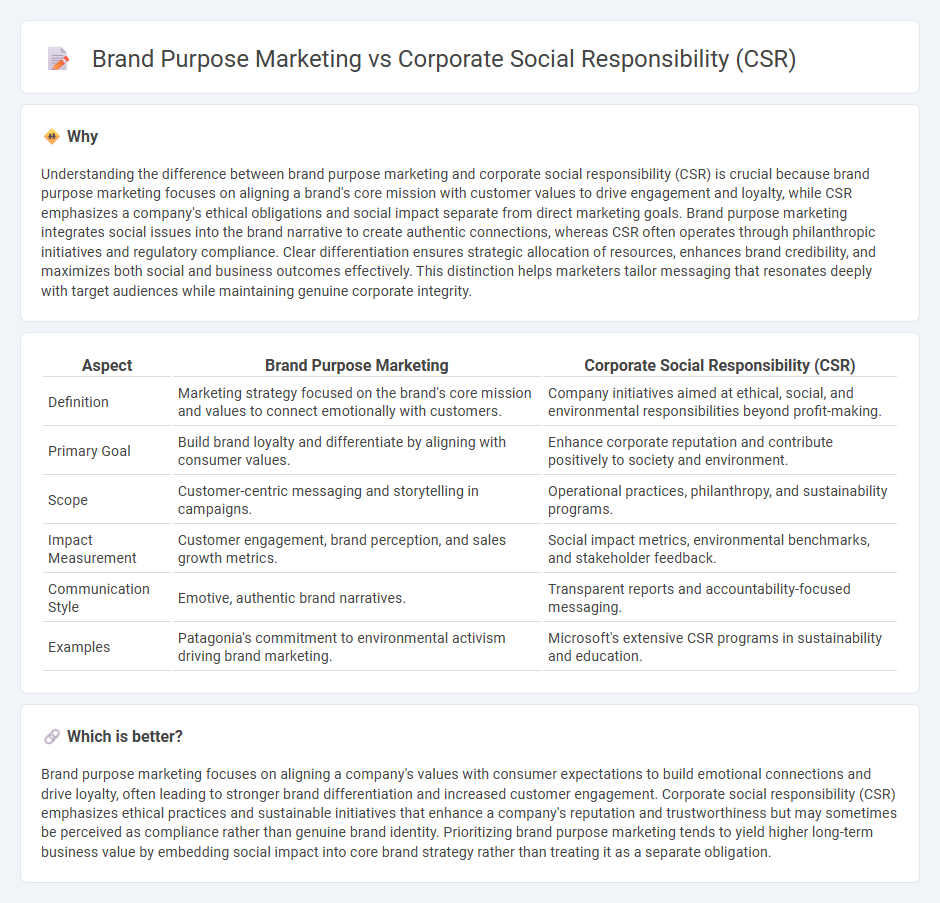
Brand purpose marketing emphasizes aligning a company's core values with customer needs to drive loyalty and create meaningful connections, while corporate social responsibility (CSR) focuses on ethical business practices and community impact to enhance reputation and compliance. Both strategies contribute to sustainable business growth by fostering trust and transparency in different yet complementary ways. Explore how integrating brand purpose marketing and CSR can elevate your marketing strategy and strengthen stakeholder engagement.
Why it is important
Understanding the difference between brand purpose marketing and corporate social responsibility (CSR) is crucial because brand purpose marketing focuses on aligning a brand's core mission with customer values to drive engagement and loyalty, while CSR emphasizes a company's ethical obligations and social impact separate from direct marketing goals. Brand purpose marketing integrates social issues into the brand narrative to create authentic connections, whereas CSR often operates through philanthropic initiatives and regulatory compliance. Clear differentiation ensures strategic allocation of resources, enhances brand credibility, and maximizes both social and business outcomes effectively. This distinction helps marketers tailor messaging that resonates deeply with target audiences while maintaining genuine corporate integrity.
Comparison Table
| Aspect | Brand Purpose Marketing | Corporate Social Responsibility (CSR) |
|---|---|---|
| Definition | Marketing strategy focused on the brand's core mission and values to connect emotionally with customers. | Company initiatives aimed at ethical, social, and environmental responsibilities beyond profit-making. |
| Primary Goal | Build brand loyalty and differentiate by aligning with consumer values. | Enhance corporate reputation and contribute positively to society and environment. |
| Scope | Customer-centric messaging and storytelling in campaigns. | Operational practices, philanthropy, and sustainability programs. |
| Impact Measurement | Customer engagement, brand perception, and sales growth metrics. | Social impact metrics, environmental benchmarks, and stakeholder feedback. |
| Communication Style | Emotive, authentic brand narratives. | Transparent reports and accountability-focused messaging. |
| Examples | Patagonia's commitment to environmental activism driving brand marketing. | Microsoft's extensive CSR programs in sustainability and education. |
Which is better?
Brand purpose marketing focuses on aligning a company's values with consumer expectations to build emotional connections and drive loyalty, often leading to stronger brand differentiation and increased customer engagement. Corporate social responsibility (CSR) emphasizes ethical practices and sustainable initiatives that enhance a company's reputation and trustworthiness but may sometimes be perceived as compliance rather than genuine brand identity. Prioritizing brand purpose marketing tends to yield higher long-term business value by embedding social impact into core brand strategy rather than treating it as a separate obligation.
Connection
Brand purpose marketing aligns a company's core mission with social and environmental values, enhancing consumer trust and loyalty. Corporate social responsibility (CSR) initiatives provide the tangible actions and commitments that support this purpose through sustainable practices and community engagement. Together, they create a cohesive strategy that drives positive impact while differentiating the brand in competitive markets.
Key Terms
Ethics
Corporate social responsibility (CSR) centers on a company's commitment to ethical practices, environmental sustainability, and social impact as part of its core operations, ensuring long-term value for stakeholders. Brand purpose marketing leverages these ethical commitments to create authentic connections with consumers, driving brand loyalty by aligning marketing messages with moral and social values. Explore how integrating ethics in CSR and brand purpose marketing can elevate both corporate reputation and consumer trust.
Stakeholder Engagement
Corporate social responsibility (CSR) centers on a company's ethical obligations and initiatives to positively impact society, involving stakeholders through transparent communication and sustainable practices. Brand purpose marketing emphasizes aligning a brand's mission with consumer values to foster emotional connections and drive loyalty among stakeholders. Discover how integrating CSR and brand purpose marketing can amplify stakeholder engagement and strengthen your brand's impact.
Authenticity
Corporate social responsibility (CSR) involves a company's commitment to ethical practices and social impact, emphasizing long-term sustainability and stakeholder value. Brand purpose marketing centers on communicating a brand's core mission and values to emotionally connect with consumers, prioritizing authenticity to build trust and loyalty. Explore how aligning CSR and brand purpose effectively can enhance genuine brand authenticity and consumer engagement.
Source and External Links
Corporate social responsibility - Wikipedia - Corporate social responsibility (CSR) is a form of international private business self-regulation aimed at contributing to societal goals through philanthropy, ethical business, and community support, evolving from voluntary company policies to also include mandated government and international standards.
What Is Corporate Social Responsibility (CSR)? - CSR is a management concept ensuring companies' day-to-day practices are ethical and socially beneficial, now integrated with environmental, social, and governance (ESG) strategies to meet consumer and stakeholder demands for transparency and social impact.
The 4 main types of corporate social responsibility your business should consider (and why) - CSR includes environmental, ethical/human rights, philanthropic, and economic responsibilities, all crucial for improving branding, employee engagement, and making a positive social impact while meeting increasing consumer demand for corporate transparency and social contribution.
 dowidth.com
dowidth.com